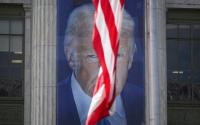July 24, 2002The Guardian
Like the Prince of Denmark, the president of the United States is haunted by his father. Nothing disturbs the sleep of George W Bush so much as the experience of George HW Bush - especially now.
Bush the First waged war on an evil Arab bogeyman and garnered through-the-roof poll numbers as his reward. He then saw those ratings tumble, as people forgot about the war and worried about their wallets instead. Along came a Democratic challenger who understood: "It's the economy, stupid." The voters agreed, thought Bush had no answers to the downturn and promptly ejected him from the White House.
That's the memory that wakes Dubya into a cold sweat. For after nearly a year riding sky-high, the president is suddenly looking vulnerable - vulnerable enough for opponents to start wondering whether the story of Bush the Father is about to be revisited on Bush the Son.
Like his dad, he was impregnable during wartime. His battle against Osama bin Laden brought him the same plaudits his father gained taking on Saddam Hussein (and the same grumbling that their prey had slipped free). Americans always rally around their president during moments of crisis, placing the incumbent almost beyond reach. So it was with Bush: no one could touch him.
But now that moment seems to be passing. "The war against terror is no longer on people's radar," says one high-ranking Democratic operative. Now the story obsessing the 24-hour news channels is the series of nuclear strikes the US economy has been launching against itself - typified by this week's bankruptcy claim by WorldCom, the largest such collapse in American history.
These hit the White House in a double blow. The first, and most direct, comes in the accusation that Bush and his confrères are personally implicated in the current wave of corporate scandals. In 1990 there was a securities and exchange commission investigation into how Bush came to sell $848,000 worth of stock in Harken Energy two months before its value plummeted. Officially that case is closed, but if the contents of the file were ever to be leaked it could spell trouble.
In more serious doo-doo is the vice-president, Dick Cheney. The oil company he used to run, Halliburton, is now under investigation by the SEC over its accountancy practices. Who did the work? Why, it was Arthur Andersen, the firm at the centre of the Enron scandal. They may be discredited now, but they obviously impressed Cheney: he appeared in a promotional video for them, praising their tendency to give more than just "by the book" advice. A shrink analysing that phrase might suggest Cheney's guilty conscience was spilling out the truth about Andersen's rule-bending service. Either way, it will make a choice clip in a Democratic attack ad of the future - especially if that SEC investigation comes down hard on the vice-president.
For the moment, though, it's not personal scandal that Republicans most fear. The real threat is that most decisive electoral factor: the economic well-being of the voters. And it's that which is taking a hammering.
If Americans are asked the old Ronald Reagan question - "Are you better off now than you were?" - they would answer with a loud "No". Witness the poll which found the number of Americans who believe their economy is in excellent or good shape has fallen from 69% when Bush took office to 35% now. No wonder. Americans are watching the stock market take a daily nosedive - 20% has been wiped off the Dow Jones since January 1 - taking with it their savings, pensions and hopes for the future. Millions of regular Americans became stockholders in the 1990s the way low- or middle-earning Britons became homeowners in the 1980s: they flocked to it, assuming it represented security. Now they are seeing all they invested evaporate before their eyes, filling them with cold fury.
And anger matters in American politics. Successive electoral earthquakes have been triggered by new movements of furious voters, whether the Reagan Democrats of 1980 or the Angry White Males who swept Newt Gingrich into the Speaker's chair in 1994. Now, predicts California Democrat Oliver Phillips, there is a new group ready to spit blood: "the 401(k) decimatees", those whose savings funds, known as 401(k)s, have been annihilated in the current meltdown.
They form a demographic that would terrify any party. Aged anywhere between 50 and 70, these are people who were getting ready to retire and now find they don't have the money - but they do vote. They, Democrats hope, will turn out in droves in November's mid-term elections - overturning the Republicans' wafer-thin majority in the House and extending the Democrats' one-seat hold of the Senate.
It's not that voters think the current economic mess is literally the fault of Bush or the Republicans (though incumbents always get punished for a slump). It's that Americans don't have any confidence in them to do anything about it. Too many believe Bush and his administration are part of the problem, rather than the solution. As the New York Times puts it: "Bush himself is a product of the cowboy end of the Sunbelt economy," while most of his team look like 19th-hole buddies of the WorldCom crowd. His army secretary is a former Enron executive, while the SEC - the body probing Cheney - is led by the one-time lawyer of the accountancy industry.
Bush has only confirmed that impression when he's tried to dispel it. When he addressed Wall Street executives this month, he showed none of the outrage millions of Americans feel. He condemned corporate "fudging of the numbers" - far too mild a phrase for what most believe is grand larceny on an unprecedented scale. Not that anyone knows what he should say: all the old Republican remedies, especially any move towards deregulation, is only likely to make matters worse. The result is that the markets are not reassured by the president's repeated interventions. "Every time Bush opens his mouth on this issue, the stock market finds a new bottom," says Phillips.
And now, at last, it's not just the Dow numbers that are moving. A poll on Monday found only 47% of Americans believe Bush deserves re-election; 32% think it's time for someone new. Which leaves Democrats with an opening.
Among party strategists, a gameplan is emerging. First, they will be careful not to oppose capitalism itself, which Americans still passionately believe in, but rather the criminals who have abused it. Second, they will take one step at a time, focusing on November 2002 before 2004. If they win Congress, they can send popular Democratic measures to the president - safe in the knowledge that he will make himself unpopular by vetoing them. Third, they will hope a vacancy arises on the supreme court: Bush would have to nominate an anti-abortion social conservative to please his rightwing, and the ensuing "culture war" would galvanise the Democratic vote, particularly women, in time for the presidential election in 2004.
Who would be the Democratic beneficiary of all this, ready to challenge the once-unbeatable-looking president? It's too early to tell, but you know who it is in Bush's nightmares: yet another little-known governor of a small southern state with an eye for the ladies and a knack for the sax - just like the man who beat his daddy.






